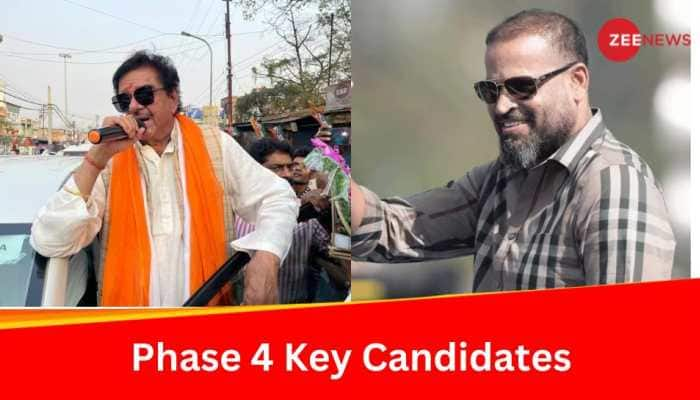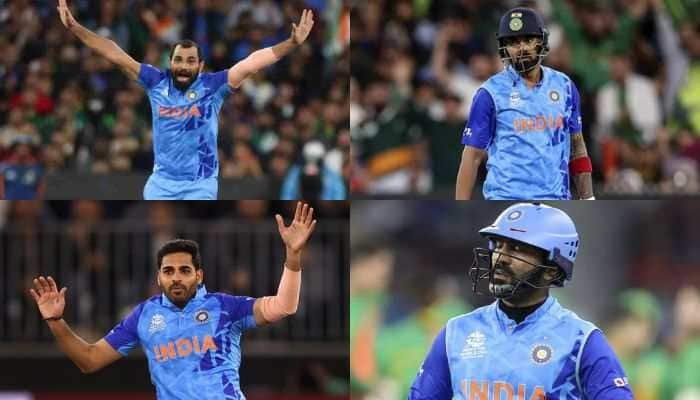Logjam jinx: Friends in private, foes in public!
Why our politicians are holding the country to ransom?
Trending Photos
)
 Ajay Vaishnav / Zee Research Group
Delhi late last week witnessed its key politicians cutting across party lines get together to celebrate Eid leading many to believe that the bonhomie would spill over to Parliament where they reassembled after a few hours for the Monsoon Session.
But what has happened now on the floor of the House is business as usual. Trust politicians to change colours like no one else, with the vocal bonhomie at a private dinner giving way to public hostile antipathy beamed live into your homes by television cameras stationed in Parliament.
The nation has been held hostage with Parliament yet again in the logjam mode. Ironically, while Shahnawaz Hussain hosted A to Z of United Progressive Alliance (UPA) at the recent Iftar party, his party (Bharatiya Janata Party or BJP) led opposition is demanding Prime Minister Manmohan Singh’s resignation over the CAG report on the coal block allocation.
The Parliament logjam is a political innovation that is being perpetuated by politicians of all hues. The strategy yielded rich political gains when it was first initiated in the coalition era by the Congress as it boycotted defence minister George Fernandes in the Vajpayee led National Democratic Alliance (NDA) regime for several months over the defence scam. The BJP took a leaf out of Congress’ book and used the strategy against former home minister P Chidambaram in the 2G spectrum case last year albeit less successfully.
But for the common man that each political combine swears to serve, the logjam mentality is nothing more than a comic irony. Given that the opposition has hinted that it won’t compromise on anything less than Singh’s head, it is everyone’s guess what would be the fate of 31 pending bills on the government’s “to-do” list.
Some of the key bills to be considered are: the Banking Laws (Amendment) Bill, Whistleblower’s Protection Bill, Land Acquisition Bill, Lokpal Bill, Higher Education and Research Bill, Educational Tribunal Bill and the National Accreditation Regulatory Authority for Higher Educational Institutions Bill. Each of these Bills has the citizen as the end user and stalled House means governance is bound to go further for a toss.
Actually, disruption is fast becoming a norm rather than an exception with our parliamentarians. In 2011, the BJP and opposition allies stalled Parliament for 11 days in a row over the issue of foreign direct investment in multi-brand retail. Likewise, in the 2010 Winter Session, the BJP-led opposition forced adjournments for 22 business days consecutively thereby stalling all legislative work.
That session was a complete waste as neither the government nor the opposition BJP relented over latter’s demand for an investigation by the Joint Parliamentary Committee into the 2G spectrum allocation scam. During the face-off, the country lost close to Rs 230 crore on account of disruptions in legislative business.
In terms of time lost due to disruptions in the House, the 15th Lok Sabha has lost precious 492 hours 293 minutes in its ten sessions so far. Lok Sabha will need 568 hours to finish legislative business lost to disruptions. The loss of Lok Sabha hours in recent years is obviously taking a huge toll as Parliament could pass just 47 and 43 bills in 2009 and 2010 respectively while in 2011, it was reduced to merely 21 bills.
The last Parliamentary session, which was the Budget Session, saw the approval of 21 bills, according to PRS Legislative Research. Overall, the 15th Lok Sabha has passed 125 bills out of 199 that have been introduced in ten sessions.
Chronic disruptions point to the extent of polarisation that has crept in our polity. In a fractured polity, stalling will inevitably become a political strategy to score brownie points with little or no regard for meeting genuine aspirations of voters. A dysfunctional, paralysed and divided polity will do no good to India and its aspiration classes already reeling under the weight of a sluggish economy and inflation.
Solace may be drawn from the fact that the legislative drift is perhaps a global phenomenon. Major democracies across the world are witnessing some kind of dysfunctionality in decision-making. US witnessed deadlock over how to raise the debt ceiling while European nations are facing deeper political and economic crisis.
India’s case, however, is more bizarre with the policy paralysis syndrome gaining currency by the day in face of one after another CAG reports. The spate of scams starting from the Commonwealth Games scam to latest Coalgate, the credibility of India’s democratic institutions is at an all-time low.
What is the way forward? It definitely can’t be knee-jerk reactions like “no work, no pay” for disrupting MPs. The way out is constant and more informed communication between the ruling and opposition parties. Here, the government has more responsibility to come forward and build bridges with the opposition. The ‘Iftar’ bonhomie must prevail if India means business.
(With inputs from Pankaj Sharma, Zee Research Group)
Ajay Vaishnav / Zee Research Group
Delhi late last week witnessed its key politicians cutting across party lines get together to celebrate Eid leading many to believe that the bonhomie would spill over to Parliament where they reassembled after a few hours for the Monsoon Session.
But what has happened now on the floor of the House is business as usual. Trust politicians to change colours like no one else, with the vocal bonhomie at a private dinner giving way to public hostile antipathy beamed live into your homes by television cameras stationed in Parliament.
The nation has been held hostage with Parliament yet again in the logjam mode. Ironically, while Shahnawaz Hussain hosted A to Z of United Progressive Alliance (UPA) at the recent Iftar party, his party (Bharatiya Janata Party or BJP) led opposition is demanding Prime Minister Manmohan Singh’s resignation over the CAG report on the coal block allocation.
The Parliament logjam is a political innovation that is being perpetuated by politicians of all hues. The strategy yielded rich political gains when it was first initiated in the coalition era by the Congress as it boycotted defence minister George Fernandes in the Vajpayee led National Democratic Alliance (NDA) regime for several months over the defence scam. The BJP took a leaf out of Congress’ book and used the strategy against former home minister P Chidambaram in the 2G spectrum case last year albeit less successfully.
But for the common man that each political combine swears to serve, the logjam mentality is nothing more than a comic irony. Given that the opposition has hinted that it won’t compromise on anything less than Singh’s head, it is everyone’s guess what would be the fate of 31 pending bills on the government’s “to-do” list.
Some of the key bills to be considered are: the Banking Laws (Amendment) Bill, Whistleblower’s Protection Bill, Land Acquisition Bill, Lokpal Bill, Higher Education and Research Bill, Educational Tribunal Bill and the National Accreditation Regulatory Authority for Higher Educational Institutions Bill. Each of these Bills has the citizen as the end user and stalled House means governance is bound to go further for a toss.
Actually, disruption is fast becoming a norm rather than an exception with our parliamentarians. In 2011, the BJP and opposition allies stalled Parliament for 11 days in a row over the issue of foreign direct investment in multi-brand retail. Likewise, in the 2010 Winter Session, the BJP-led opposition forced adjournments for 22 business days consecutively thereby stalling all legislative work.
That session was a complete waste as neither the government nor the opposition BJP relented over latter’s demand for an investigation by the Joint Parliamentary Committee into the 2G spectrum allocation scam. During the face-off, the country lost close to Rs 230 crore on account of disruptions in legislative business.
In terms of time lost due to disruptions in the House, the 15th Lok Sabha has lost precious 492 hours 293 minutes in its ten sessions so far. Lok Sabha will need 568 hours to finish legislative business lost to disruptions. The loss of Lok Sabha hours in recent years is obviously taking a huge toll as Parliament could pass just 47 and 43 bills in 2009 and 2010 respectively while in 2011, it was reduced to merely 21 bills.
The last Parliamentary session, which was the Budget Session, saw the approval of 21 bills, according to PRS Legislative Research. Overall, the 15th Lok Sabha has passed 125 bills out of 199 that have been introduced in ten sessions.
Chronic disruptions point to the extent of polarisation that has crept in our polity. In a fractured polity, stalling will inevitably become a political strategy to score brownie points with little or no regard for meeting genuine aspirations of voters. A dysfunctional, paralysed and divided polity will do no good to India and its aspiration classes already reeling under the weight of a sluggish economy and inflation.
Solace may be drawn from the fact that the legislative drift is perhaps a global phenomenon. Major democracies across the world are witnessing some kind of dysfunctionality in decision-making. US witnessed deadlock over how to raise the debt ceiling while European nations are facing deeper political and economic crisis.
India’s case, however, is more bizarre with the policy paralysis syndrome gaining currency by the day in face of one after another CAG reports. The spate of scams starting from the Commonwealth Games scam to latest Coalgate, the credibility of India’s democratic institutions is at an all-time low.
What is the way forward? It definitely can’t be knee-jerk reactions like “no work, no pay” for disrupting MPs. The way out is constant and more informed communication between the ruling and opposition parties. Here, the government has more responsibility to come forward and build bridges with the opposition. The ‘Iftar’ bonhomie must prevail if India means business.
(With inputs from Pankaj Sharma, Zee Research Group)







)
)
)
)
)
)
)
)
)
)
